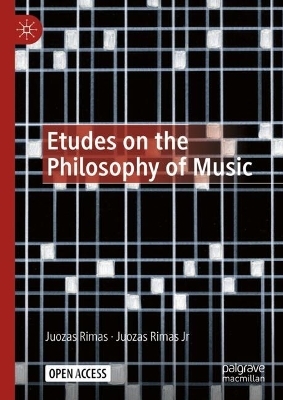
Etudes on the Philosophy of Music
Springer International Publishing (Verlag)
978-3-031-63964-7 (ISBN)
Drawing on the author's four decades of experience as a concert oboist, this open access book studies a number of foundational issues in the philosophy of music, such as musical meaning and expression, musical ontology and the existence of the musical work, the relation between music and language, and the phenomenology of music. The book surveys the development of Western classical music from the Baroque era through to the 20th century, both from the perspective of contemporary Lithuanian philosophers such as Girnius, Maceina, Sliogeris, and Jackunas, and 20th century European philosophy. In addition to discussing key questions in the philosophy of music, the book also analyses technical musical terms such as articulation, phrasing, and rhythm.
Juozas Rimas was the leading Lithuanian oboist of his generation and is currently professor of music at the Lithuanian Academy of Music and Theatre. He has premiered over 40 works for oboe (many of them dedicated to him) and was the first wind player in Lithuania to have performed a solo recital back in 1971. He is the recipient of an award from the President of the Republic of Lithuania for his lifetime contribution to Lithuanian culture and art. Professor Rimas' musical career has comprised hundreds of performances of classical music in all forms (orchestra, ensemble, and solo) as well as jazz improvisations and Lithuanian folk songs sung by the author, 16 LP and CD recordings, and over 150 recordings for Lithuanian State Radio.
Dr Juozas Rimas Jr is the editor and co-translator of this book (assisting the main translator, Jeremy Hill), and author of the appendices and footnotes. He obtained a doctorate in law from Vilnius University in 2010 and is a practising lawyer in the field of corporate law. He is also the editor of the original Lithuanian edition of Etudes on the Philosophy of Music, published in 2020.
1. Introduction.- 2. The Origin of Music and Its Specific Characteristics (the Historical-Ontological Aspect).- 3. Music - a Part of Spiritual Culture.- 4. The Fundamental Elements of Musical Expression.- 5. Some Principles of Baroque Aesthetics which are Important for Musical Expression.- 6. Voice and Sound.- 7. Music and Language.- 8. Music and Time.- 9. Musical Rhythm.- 10. Musical Articulation.- 11. Musical Agogics.- 12. Musical Phrasing.- 13. Sign and Expression.- 14. The Foreground and Background (Inner) Dimensions (Forms) of a Musical Work.- 15. The Text and the Work.- 16. Interpretation (the Main Form of the Manifestation of Music).- 17. The Transcendental Quality of a Musical Work.- 17. The Concept of Creativity (and its Importance for Musical Expression).- 18. Instrumentalising Creativity - Depriving Musical Expression of Meaning.- 19. The Logic of Music.- 20. A Philosophical Approach to Musical Expression: Necessity or Possibility.- 21. Significance and Meaning (the Given and the Goal).- 23. Musical Thinking.- 24. Arnold chönberg on Musical Thought.- 25. Anton Webern on the "Saying" of Music.- 26. Ernest Ansermet on Music and its Performance.- 27. The Phenomenological Approach to Musical Expression. 28. Conclusion.
| Erscheinungsdatum | 15.09.2024 |
|---|---|
| Zusatzinfo | Illustrationen |
| Verlagsort | Cham |
| Sprache | englisch |
| Original-Titel | Muzikos filosofijos etiudai |
| Maße | 148 x 210 mm |
| Einbandart | gebunden |
| Themenwelt | Kunst / Musik / Theater ► Musik ► Klassik / Oper / Musical |
| Kunst / Musik / Theater ► Musik ► Musiktheorie / Musiklehre | |
| Geisteswissenschaften ► Philosophie | |
| Schlagworte | 20th century music • Classical music • Expression • Lithuanian Music • musical work • music theory • Ontology • open access |
| ISBN-10 | 3-031-63964-2 / 3031639642 |
| ISBN-13 | 978-3-031-63964-7 / 9783031639647 |
| Zustand | Neuware |
| Informationen gemäß Produktsicherheitsverordnung (GPSR) | |
| Haben Sie eine Frage zum Produkt? |
aus dem Bereich


